Today’s shots are from Nov. 4th, 2013, when the weather was gray, cloudy, and showery. I’m using a mixture of focal lengths today–some 500mm, 700mm, and 1000mm. At the end of the day, it got dark very early due to the thick cloud cover and I tried some high ISO test shots (the last 7 shots) just for the heck of it, shooting whatever I could find on my final loop of the day.
Let’s start with a Red-tailed Hawk up in a tree. [Click once on the thumbnails below to see a larger view!].
Canon 5D Mark III. 1/1000, f5.6, ISO 2500, 500mm. (9:07 a.m.)
This is what I believe is a juvenile Golden-crowned Sparrow. Not the best shot but a cute bird. Canon 5D Mark III. 1/1000, f4, ISO 2500, 500mm. (9:51 a.m.)
My first spotting today of a Black-tailed Deer. She was having a little breakfast to start the day. Canon 5D Mark III. 1/1250, f4, ISO 1250, 500mm. (10:18 a.m.)
I only got a few frames of this Red-tailed Hawk fairly close up in a tree. At the time I was sure they’d be throw-aways due to the dark conditions and the limbs in front of the hawk. After I processed the shot, I ended up kind of liking it. The hawk is extraordinarily beautiful and the green around it helps make the bird pop, even if it is partially obstructed by leaves and limbs. Canon 5D Mark III. 1/1000, f4, ISO 1250, 500mm. (10:44 a.m.)
Over on the gate near the Ducks Unlimited sign, some Golden-crowned Sparrows were hanging out. Canon 5D Mark III. 1/800, f4, ISO 2000, 500mm. (10:52 a.m.)
I’m now stopped just past marker #11 and there’s a beautiful immature Bald Eagle perched on the limb of the lone tree south of the road. I’ve taken shots from here (275 feet) with the longer focal lengths and thought I’d try it at 500mm. Conditions were against me though and this was actually shot through some fog. Canon 5D Mark III. 1/1000, f4, ISO 2000, 500mm. (11:24 a.m.)
One of the big surprises of the day was that this American Kestrel let me approach much closer than kestrels typically allow–about to 25 feet. Canon 5D Mark III. 1/1000, f4, ISO 2000, 500mm. (11:56 a.m.)
This next series of shots of a Hooded Merganser pair were the last at 500mm. Both birds were unusually unaffected by my presence (in my vehicle). This first shot catches the bird in a little head shake. Canon 5D Mark III. 1/1250, f4, ISO 2500, 500mm. (1:30 p.m.)
And, a flattened-out hood.
Nice pose!
Both eyes in the same shot! 🙂
Lovely profile pose!
The female was perched on this log while I was taking the male’s picture. For this stationary female, I should have slowed the shutter speed to gain a better ISO setting, but the image turned out okay anyway.
Canon 5D Mark III. 1/800, f4, ISO 2000, 500mm. (1:34 p.m.)
Now I’m parked just past marker #11 at the same spot the above immature eagle was captured. The bird that is perched at the top of this tree (275 feet away) is a nearly-mature Bald Eagle, probably 4-years old based on the almost completely white head and tail feathers. I decided to change over to 700mm and put on the 1.4x III converter.
This first shot shows the bird just trying to keep its balance on this precarious perch. Canon 5D Mark III. 1/1250, f5.6, ISO 2000, 700mm. (2:03 p.m.)
The bird decides to make a small leap to a branch a few feet to my right. Unfortunately, I didn’t nail the focus but I love the pose. Canon 5D Mark III. 1/1250, f5.6, ISO 2000, 700mm. (2:14 p.m.)
Here’s the same bird relaxing on its new perch and checking me out. Canon 5D Mark III. 1/1250, f5.6, ISO 2000, 700mm. (2:16 p.m.)
My field of view out of my truck passenger-side window is very limited since I have to lean across the seat to take these shots. I had no idea about what was approaching from my right (one of the disadvantages of the requirement that visitors are to stay inside their cars from Oct. thru Apr). All I could see is that the 4-year old bird decided to take off, so I tried to get some shots of it in flight. Canon 5D Mark III. 1/1250, f5.6, ISO 2000, 700mm. (2:19 p.m.)
After shooting the younger bird, I looked up and noticed that a pair of mature birds had now taken its place in the tree. I missed the landing of this pair but now I had two new subjects to photograph. I guess they call this “right place, right time.” 🙂 I took lots of shots of these two but it wasn’t long before the lower bird hopped onto a perch that put a big branch right in front of it. So this next shot is one of the few I got of both birds fully unobstructed and having decent poses. Canon 5D Mark III. 1/1250, f5.6, ISO 2000, 700mm. (2:20 p.m.)
Here, the top bird ruffles its feathers and calls out at the same time. Canon 5D Mark III. 1/1250, f7.1, ISO 2000, 700mm. (2:25 p.m.)
And again, the top bird giving me the eye(s). At this point, I switched over to 1000mm, replacing the 1.4x with the 2x III converter. I try bettering my ISO by slowing my shutter speed to 1/400. By doing this though, I risk ending up with very blurry shots if the birds suddenly take flight since 1/400 will usually not stop flight action. Canon 5D Mark III. 1/320, f8, ISO 1250, 1000mm. (2:52 p.m.)
I decide to leave the eagles and drive on down the road a hundred yards or so. Off to my right are some Northern Pintails in the water–not way out there but not real close either. Canon 5D Mark III. 1/400, f8, ISO 2000, 1000mm. (3:01 p.m.)
Driving a bit further down the road I spot a Northern Harrier atop one of the posts near marker #12. I didn’t dare get closer than 50-60 feet. Even at that, the bird gave me only a few frames before flying off. Canon 5D Mark III. 1/400, f8, ISO 3200, 1000mm. (3:04 p.m.)
Just readying for takeoff. Canon 5D Mark III. 1/400, f8, ISO 3200, 1000mm. (3:04 p.m.)
On my approach to the main parking area, I was surprised to find this pair of Black-tailed Deer working the berm on the right. The doe didn’t care that I was there but the buck was quite skittish and began walking away from me quickly. I started up the truck and followed him a short distance stopping in a position that allowed me to shoot freely from the driver’s side window. I may have made a little sound to get the deer to stop and turn around for a second. Canon 5D Mark III. 1/400, f8, ISO 4000, 1000mm. (3:16 p.m.) Notice that my ISO setting is starting to creep higher as conditions get darker.
The doe didn’t run so she was so close I couldn’t get her all in the frame. Canon 5D Mark III. 1/400, f8, ISO 4000, 1000mm. (3:17 p.m.)
Driving to the parking area, this Western Scrub Jay is perched maybe 20 feet away on a post. Canon 5D Mark III. 1/400, f8, ISO 4000, 1000mm. (3:22 p.m.)
EXTREME HIGH ISO TEST SECTION
Conditions are so dark now, I elect to turn up the ISO to extreme high settings just to see what kinds of images I can get in low light conditions. These remaining shots are true test shots–some more successful than others. The next 4 images were taken at ISO 10,000. In addition, the b&w harrier was at an extreme distance.
A preening duck at ISO 10,000. Canon 5D Mark III. 1/1000, f8, ISO 10000, 1000mm. (4:05 p.m.)
I had to sacrifice a lot of detail here for less noise. Not a good result. Canon 5D Mark III. 1/1000, f8, ISO 10000, 1000mm. (4:12 p.m.)
A Great Blue Heron from a reasonably close distance. Canon 5D Mark III. 1/1000, f8, ISO 10000, 1000mm. (4:18 p.m.)
And, a Nutria at about 30 feet–ISO 12,800. Canon 5D Mark III. 1/500, f8, ISO 12800, 1000mm. (4:28 p.m.)
ISO 12,800 shot of a harrier close to 200 feet away. Not enough pixels to support much detail. Canon 5D Mark III. 1/500, f8, ISO 12800, 1000mm. (4:35 p.m.)
A last test shot of a Great Blue Heron at close range. This is a full frame image at ISO 12,800. Canon 5D Mark III. 1/500, f8, ISO 12800, 1000mm. (4:41 p.m.)
These high ISO tests reinforce the notion that closeness to the subject is a major key to sharpness–as it is in any situation. Long distance shots really become bad quickly and are seldom usable. Good post-processing tools and technique are necessary to reduce noise while not sacrificing too much detail. I’ve seen from these tests that in extreme low light situations, it’s probably best just to pass up longer distance shots when high ISO settings are necessary. Close to the subject shots, however, do have a chance of a decent result. Lighter colored subjects do better than dark subjects since noise is more noticeable in dark areas of an image. In other words, all the guidelines remain the same as in ‘normal’ ISO photography but the necessity for ample pixels on your subject becomes more apparent quickly and a much higher percentage of shots will be destined for the trash.
I want to say Happy Birthday to my mother-in-law, Jo, who would have been 92 today, Nov. 4!
My next blog post will cover my Nov. 13 shoot. Take care and we’ll see you then!
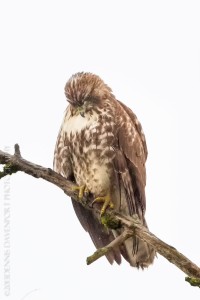
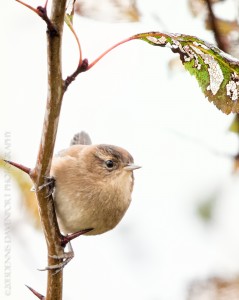
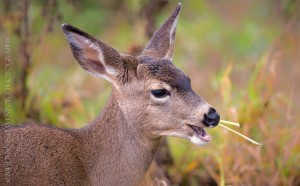
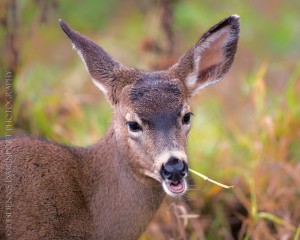
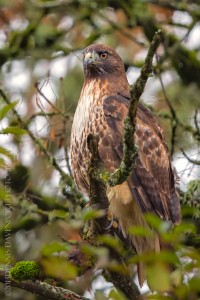
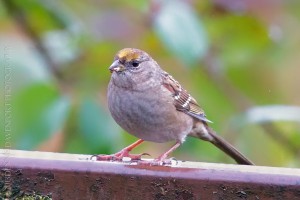
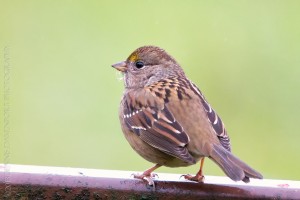
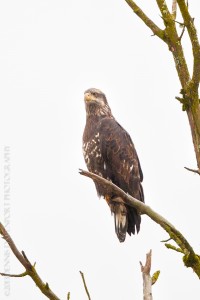
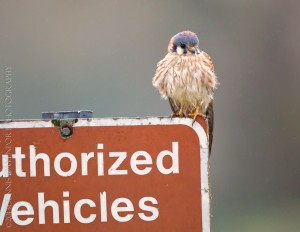
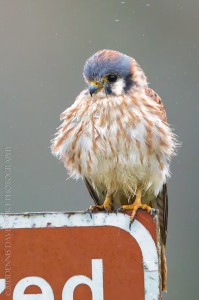
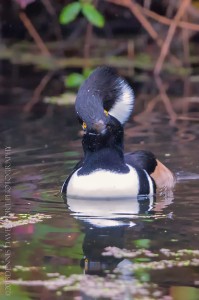
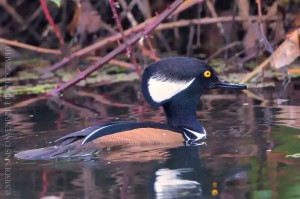
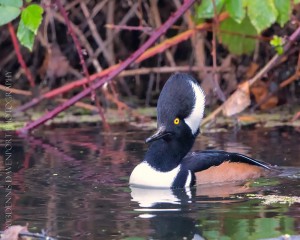
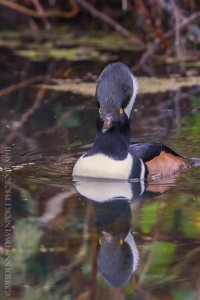
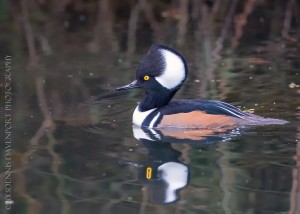
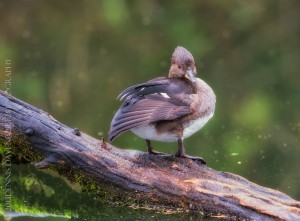
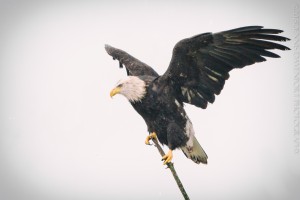
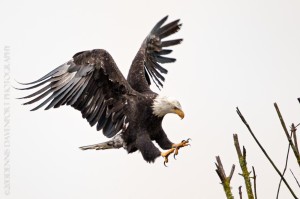
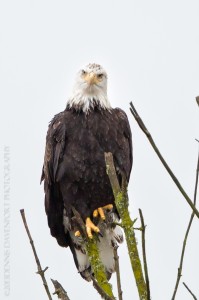
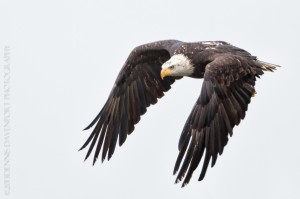
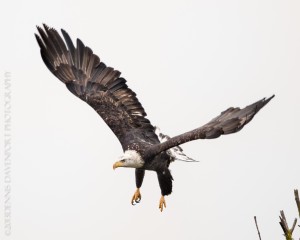
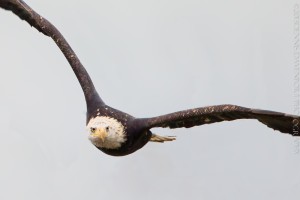
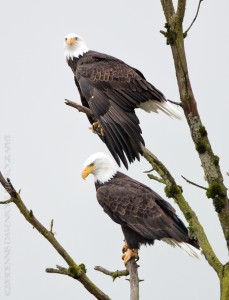
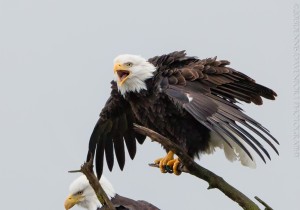
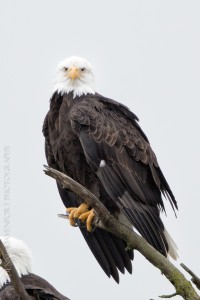
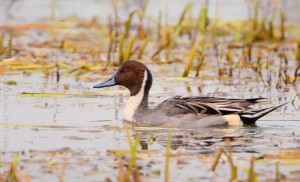
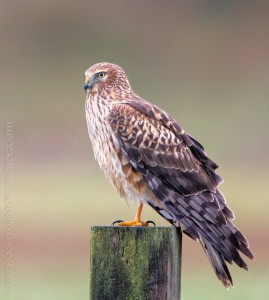
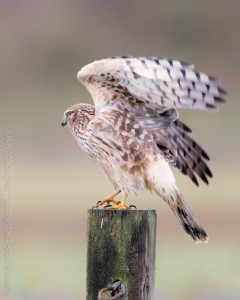
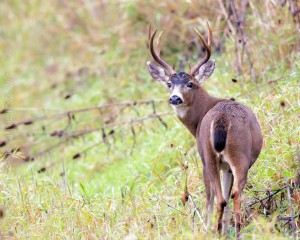
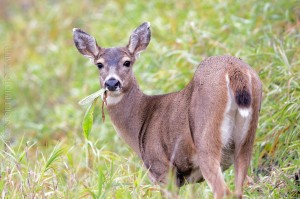
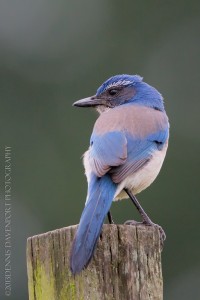
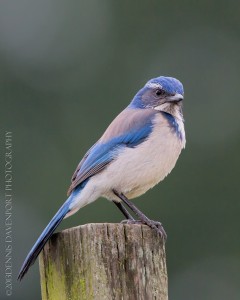
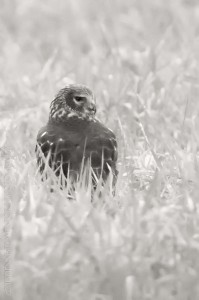
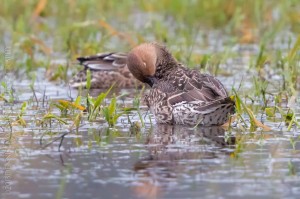
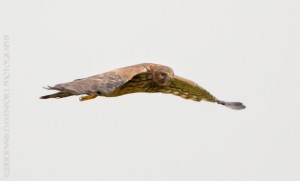
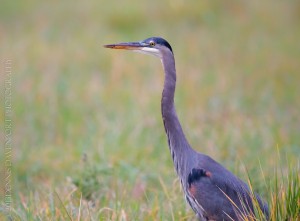
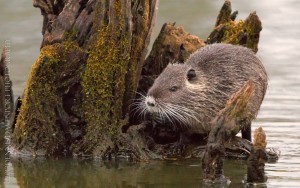
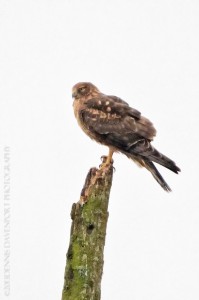
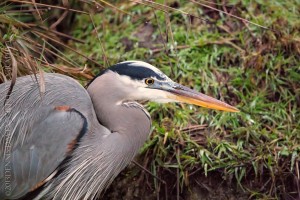
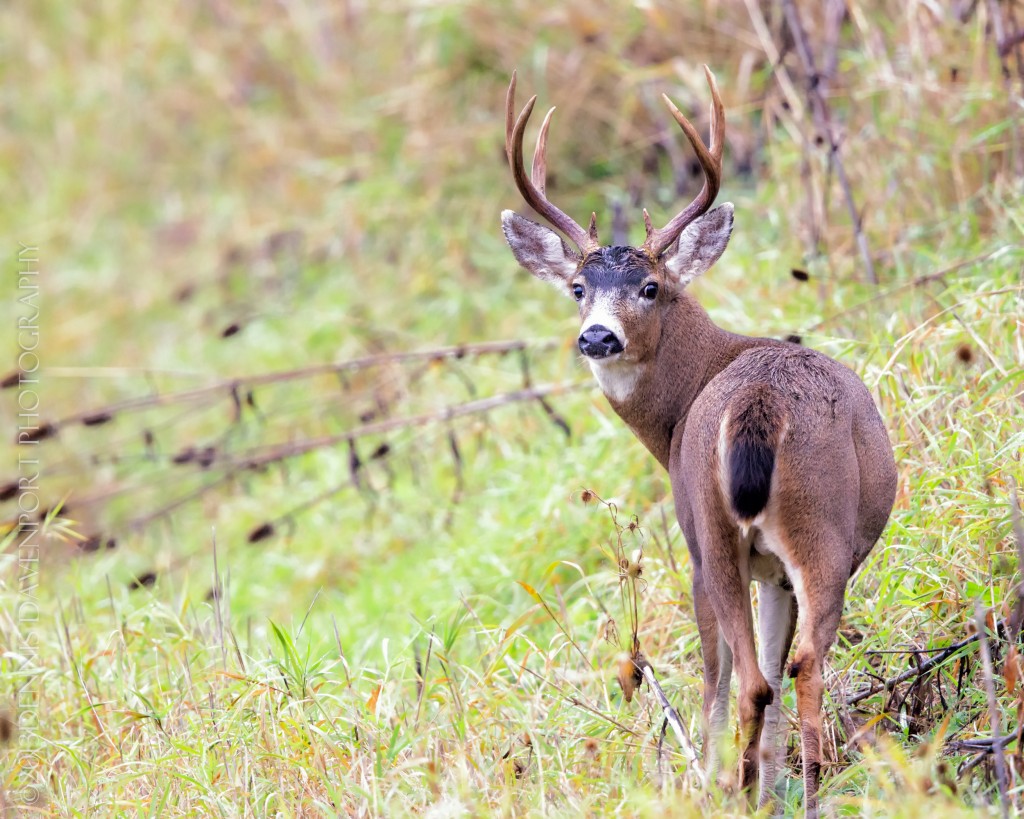
Wonderful Eagle shots Scott!
Thanks, Gary! Glad you liked them–and the buck!
And the buck!!